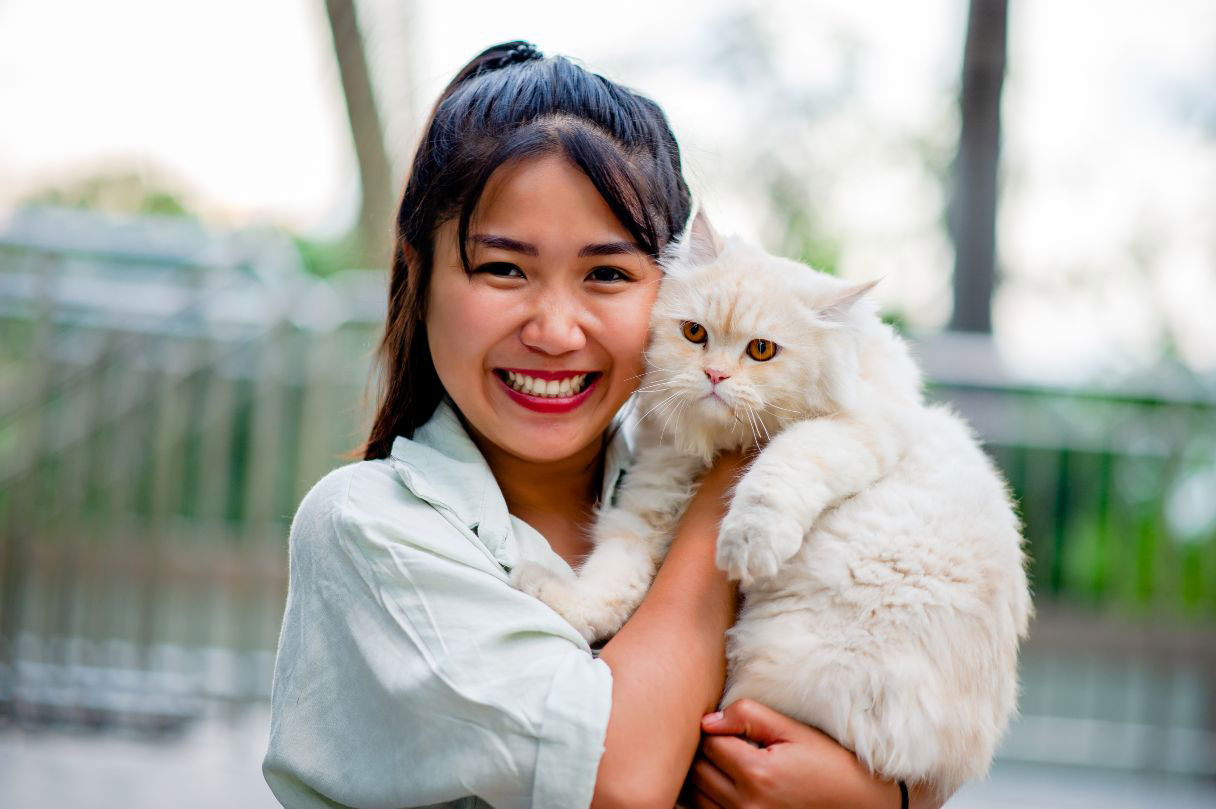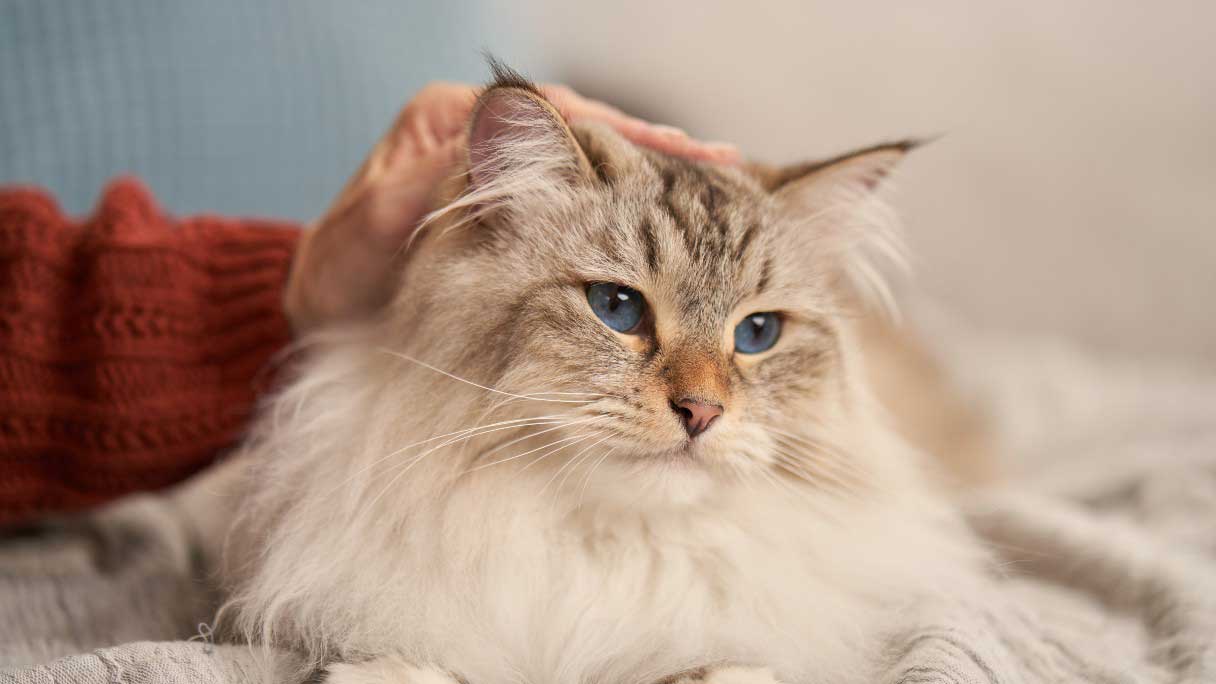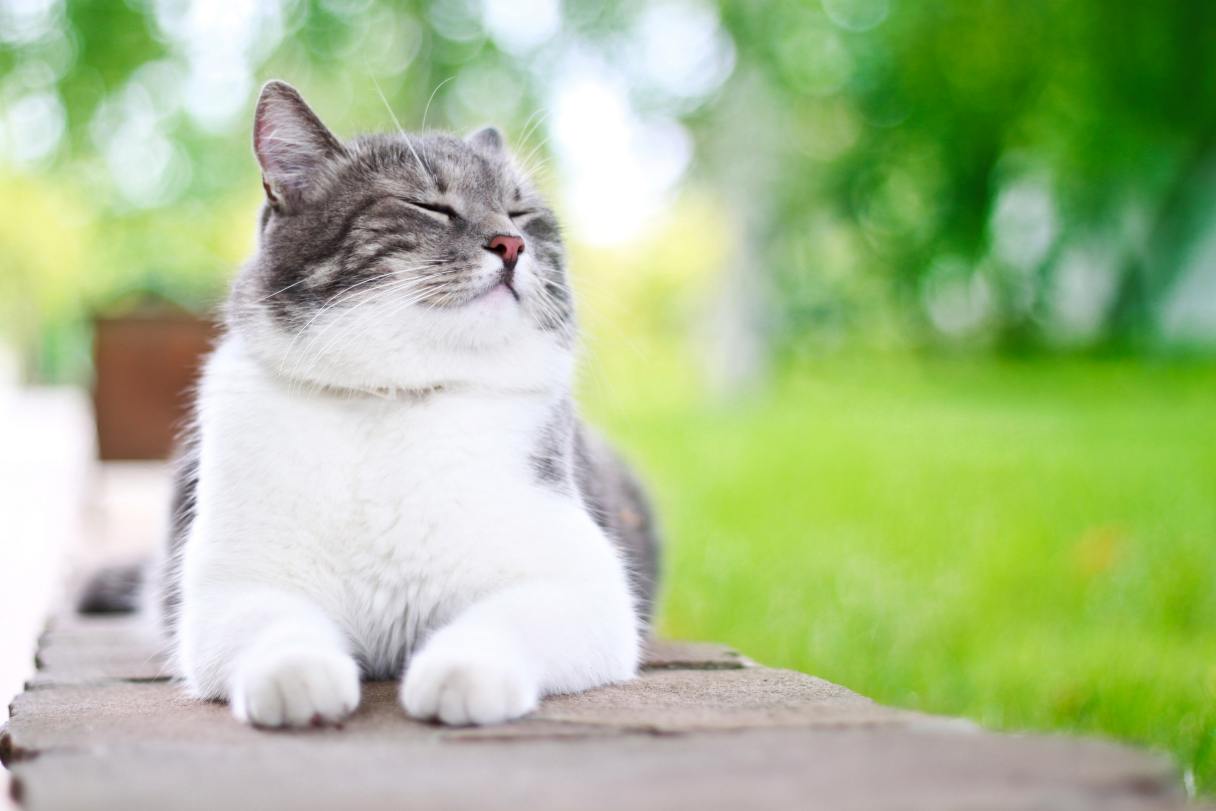Eating all that lasagna and sleeping all the time never caused Garfield any health problems. Sadly, though, the same isn't true for real-life cats: 61% of pet cats in the United States are reported as overweight or obese, an epidemic that has led to a host of feline health problems. And yet, only 28% of cat owners recognize that their kitties are on the chonky side.1
So, is your kitty a chonkin' chonk, or are they just fluffy? Here are 11 key signs that mean your cat needs to lose weight — and how to help them if they do.
1. You Can't See Their Waist
On a normal-weight cat, you should be able to stand over them and see a visible waistline between the rib cage and the hip joints. This might be difficult to see on long-haired cats, but if you run your hand down their back and along their sides, you should feel where the waist curves inward. If you can't detect a waist, your kitty might be overweight.2
2. You Can't Feel Their Ribs
While the ribs shouldn't be so prominent that you can see them at a distance, up close you should be able to see the outline of your kitty's ribs or feel them beneath the fur and skin without pressing very hard. If you have to press through layers of fat to detect the ribs, or you can't feel them at all, your kitty may need to lose weight.2
3. You Can't Feel Their Spine
At a healthy weight, a cat's spinal column should be slightly visible or easily felt when petting them. But just as with the ribs, it shouldn’t be so obvious that your cat looks bony.3
4. They Have a Pronounced Tummy
When looking at your cat from the side, their chest should curve up into a smaller abdominal section. If there's no curve, or their tummy curves down and out instead, you've got a fat cat.3
5. You Need to Loosen Their Collar
You know you're gaining weight when you need to loosen your belt or your pants are becoming too tight. Similarly, your kitty's collar becoming too tight is a good indication that they're putting on weight.
6. They Aren't as Playful as They Used to Be
Overweight cats tend to have less energy or run out of steam more quickly than normal-weight cats. The extra weight they carry puts additional strain on their cardiovascular system, which can cause them to get winded or simply tire more easily.4
7. Trouble Jumping on Things or Climbing Stairs
Besides extra wear and tear on the joints due to supporting more weight than they were meant to, fat cells produce inflammatory chemicals that also increase joint stiffness and pain. This can make your kitty reluctant to climb and jump.5
8. Poor Grooming
Excess fat might make it hard for your kitty to reach parts of their body to groom themselves properly, leading to dirty skin and matted fur on their hind end, especially around the nether regions.6
9. Skin and Coat Problems
Besides the grooming difficulty, stress from extra weight can cause hair loss, baldness and other issues with the skin or coat.7
10. Heavy Breathing
Extra fat puts added pressure on the lungs. An overweight cat might get winded and breathe more heavily following physical exertion.8
11. Recurring Urinary Tract Issues
Overweight cats are more prone to urinary tract infections (UTIs) and blockages. If UTIs and other urinary issues keep recurring, this could be a sign that your kitty needs to lose weight.9
Why Your Cat May Be Gaining Weight
Several factors can cause cats to gain weight. Here are some of the most common:
- Aging. Once cats reach middle age, their metabolism slows down, causing them to burn fewer calories. They become more prone to weight gain as they get older.10
- Lack of exercise. Combined with overfeeding, not burning enough calories through exercise and activity also contributes to weight gain in cats. Indoor cats with fewer opportunities to get active are especially at risk for gaining weight.11
- Medication that causes weight gain. Weight gain is a common side effect of steroidal medications in cats.10
- Neutering. Male cats may have increased appetites after being neutered, causing them to eat more if given the chance.10
- Overfeeding. One of the top causes of weight gain and obesity in cats is eating more calories each day than they burn.11
- Stress. Just as some humans are prone to do, stressed cats may eat to soothe themselves when they’re stressed out.10
- Underlying health issues. Unexplained weight gain could be a sign of an underlying illness. If your cat gains weight suddenly, you should have your vet check them out.2
- Understimulation. Aside from leading to inactivity, the lack of opportunities for indoor cats to do the things that come naturally to those outdoors can also lead to boredom. Given the chance, they'll eat more and sleep more, simply because they're bored.10
Feline Obesity Health Issues
While lifetime studies on cats have yet to be conducted, studies on dogs have shown that moderately overweight dogs live almost two years less than their healthy counterparts. As for cats, those who are obese tend to have a 2.8-fold increase in mortality rates than normal-weight cats.7
Overweight and obese cats are at an elevated predisposition for several health issues that can contribute to a shorter lifespan. These include:7
- Anesthesia complications
- Arthritis and joint issues
- Cancer
- Chronic inflammation9
- Diabetes
- Heart disease
- High blood pressure
- Respiratory issues8
- Skin and coat issues
- Urinary tract disorders
What Is a Healthy Weight for Cats?
Your cat's ideal weight depends on their breed and the size of their frame. Domestic shorthair cats — aka the common house cat — typically weigh around 8 to 10 pounds, while some purebred cats may be smaller or larger.12
Here's a sample chart of the ideal weight for cats based on breed:12
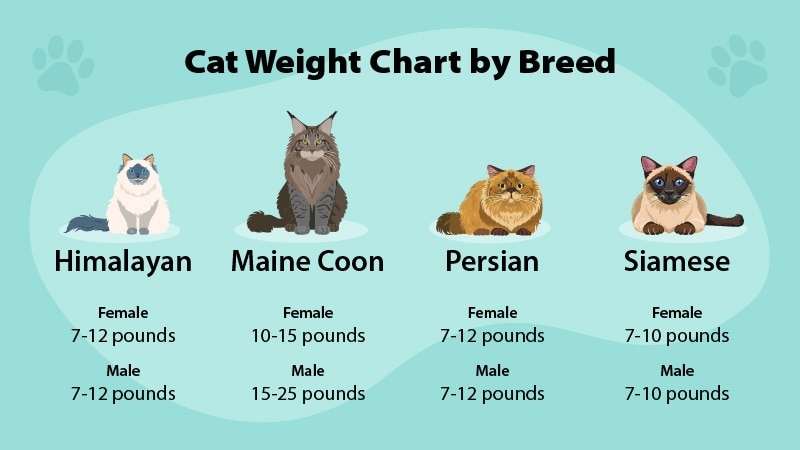
Understanding the Cat Body Condition Score
Veterinarians assess whether or not a cat is overweight using a body condition score. Some vets use a scoring scale of one to five, with three being the ideal weight and body condition. Alternatively, some vets use a scale from one to nine, with five being ideal. In either case, a one would be dangerously underweight, while a five or nine, depending on the scale, would be dangerously obese.7
Generally, vets assess your cat's body condition using the same method you can use at home — by examining them to see how visible the ribs and spine are and whether they have a visible waist when viewed from above.7
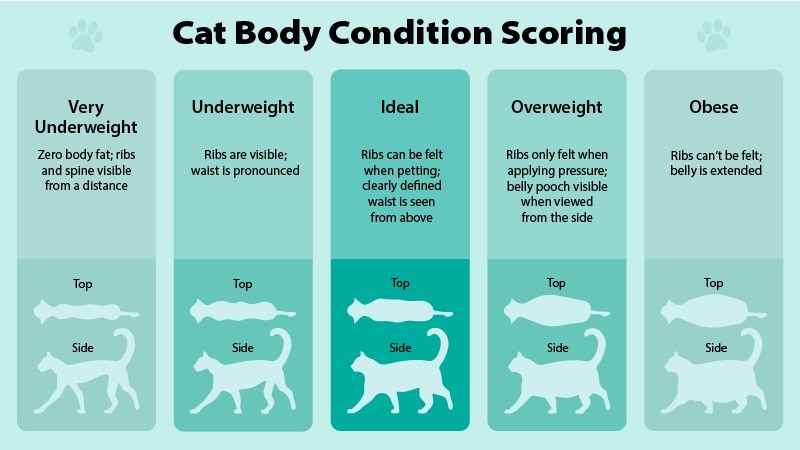
Tips to Help Your Cat Lose Weight
Cat weight loss isn't that different from human weight loss — it comes down to reducing calories and increasing exercise. Follow these tips to help your kitty slim down to a healthy weight:
- Talk to your vet. A veterinarian can either rule out or diagnose and treat any underlying health conditions that might contribute to your cat's weight gain, as well as treat any conditions that were brought on by the excess weight. Your vet can also determine your kitty's ideal target weight and calculate the number of daily calories you should feed them for weight loss, and also advise you on healthy changes you should make to their diet and lifestyle.11
- Change your cat's diet. With the supervision of your vet, switch your kitty to cat food that is formulated for weight loss, which should be nutritionally dense without being heavy on carbs and calories. You shouldn’t simply cut back on the amount of your cat’s current food, which could result in dangerous nutritional deficiencies.13
- Switch to wet food. Canned cat food delivers more protein and nutrients with fewer calories than dry food, which might help your cat feel more satiated.14
- Measure their food. Make sure you're feeding your cat the right amount each day to avoid overfeeding. Using a food scale to measure food is the most accurate method, but you can use a measuring cup if a scale's not available.13
- Feed them on a schedule. Free feeding — filling your cat's bowl with kibble and letting them serve themselves throughout the day — encourages overeating. Instead, feed your kitty three or four small meals at scheduled intervals throughout the day.13
- Use puzzle feeders. If your cat inhales their food, puzzle feeders or slow-feeding bowls will slow them down so they have a chance to realize when they feel full, and also provide mental stimulation that prevents boredom.13
- Limit treats. Treats should be factored into your kitty's daily calorie intake. Hold back portions of their daily measured food allotment to use for treats and rewards. And never feed them table scraps.13
- Encourage activity and exercise. Try to get your kitty to engage in two 15-minute play and exercise sessions each day. You could provide indoor cats with toys and climbing surfaces to encourage activity and movement, and if your house has stairs, encourage them to follow you up and down the stairs. Moving their bowl upstairs from the kitchen can also do the trick.13
- Feed your cats separately. If you have more than one cat, they might be inclined to eat more out of stress and fear of having their food stolen by the competition. Feeding them in separate rooms may help them both relax and eat more slowly, helping them feel fuller sooner.6
Your kitty is precious, and so is their health. As tempting as it might be to indulge them when they're dialing up the cuteness, taking the necessary steps to achieve and maintain a healthy cat weight will help them keep on being cute for longer.
CareCredit Credit Card Financing for Cats
The CareCredit credit card is an easy way to pay for your cat’s annual checkups, food and products at veterinary practices in the CareCredit network.* Use our Acceptance Locator to find a veterinarian near you that accepts CareCredit to help keep your pet healthy and happy for a lifetime of love. CareCredit is there for you and your pet every step of the way; continue your wellness journey by downloading the CareCredit Mobile App to manage your account, find a provider on the go and easily access the Well U blog for more great articles, podcasts and videos.
In addition to pet care, you can also use your CareCredit credit card for dentistry, cosmetic, vision, hearing, health systems, dermatology, pharmacy purchases, spa treatments and so much more within the CareCredit network. How will you invest in your health and wellness next?
Author Bio
Jean Marie Bauhaus is a freelance writer and novelist who has been writing pet content since 2013. Her work has appeared on Forbes.com, Hill's Pet, Chewy, AKC.org and more.



